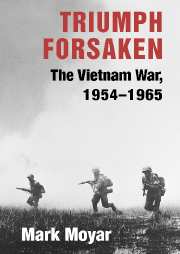Book contents
- Frontmatter
- Contents
- List of Illustrations
- Preface
- Acknowledgments
- Triumph Forsaken
- Southeast Asia
- Map of Indochina
- Map of South Vietnam (Communist)
- Map of South Vietnam (Republic of Vietnam)
- 1 Heritage
- 2 Two Vietnams: July 1954–December 1955
- 3 Peaceful Coexistence: 1956–1959
- 4 Insurgency: 1960
- 5 Commitment: 1961
- 6 Rejuvenation: January–June 1962
- 7 Attack: July–December 1962
- 8 The Battle of Ap Bac: January 1963
- 9 Diem on Trial: February–July 1963
- 10 Betrayal: August 1963
- 11 Self-Destruction: September–November 2, 1963
- 12 The Return of the Twelve Warlords: November 3–December 1963
- 13 Self-Imposed Restrictions: January–July 1964
- 14 Signals: August–October 1964
- 15 Invasion: November–December 1964
- 16 The Prize for Victory: January–May 1965
- 17 Decision: June–July 1965
- Abbreviations Used in Notes
- Notes
- Index
- Plate section
16 - The Prize for Victory: January–May 1965
Published online by Cambridge University Press: 05 August 2012
- Frontmatter
- Contents
- List of Illustrations
- Preface
- Acknowledgments
- Triumph Forsaken
- Southeast Asia
- Map of Indochina
- Map of South Vietnam (Communist)
- Map of South Vietnam (Republic of Vietnam)
- 1 Heritage
- 2 Two Vietnams: July 1954–December 1955
- 3 Peaceful Coexistence: 1956–1959
- 4 Insurgency: 1960
- 5 Commitment: 1961
- 6 Rejuvenation: January–June 1962
- 7 Attack: July–December 1962
- 8 The Battle of Ap Bac: January 1963
- 9 Diem on Trial: February–July 1963
- 10 Betrayal: August 1963
- 11 Self-Destruction: September–November 2, 1963
- 12 The Return of the Twelve Warlords: November 3–December 1963
- 13 Self-Imposed Restrictions: January–July 1964
- 14 Signals: August–October 1964
- 15 Invasion: November–December 1964
- 16 The Prize for Victory: January–May 1965
- 17 Decision: June–July 1965
- Abbreviations Used in Notes
- Notes
- Index
- Plate section
Summary
the political dispute in saigon was ostensibly solved on January 6 of the new year. The army officially ceded political control to a provisional civilian government led by Tran Van Huong, and this government was instructed to organize the election of a civilian legislature in the near future. Some of the generals, however, soon engaged in intrigue with Tri Quang aimed at subverting the new government. Buddhist and student leaders organized new demonstrations, issued fresh denunciations of Huong, and rejected pleas from an interfaith committee to discuss their alleged grievances with Huong's representatives. Tri Quang implored Taylor to force Huong's resignation, but the ambassador refused, and in fact Taylor secretly encouraged Huong – who had impressed the Americans with his limited successes in suppressing Buddhist agitators – to stand firm against efforts by Khanh and Tri Quang to usurp his power. Tri Quang then told the Americans that the new government had perpetrated acts of religious persecution, including the killing of four Buddhists who were walking to a pagoda for prayer. The Americans investigated the charges and found them to be false. After one of his meetings with Tri Quang later in the month, Taylor complained, “All we got was another repetitious airing of grievances which ring true only in the ears of the leaders of the Buddhist Institute,” and Khanh himself conceded that the militant Buddhists' accusations were baseless.
- Type
- Chapter
- Information
- Triumph ForsakenThe Vietnam War, 1954–1965, pp. 350 - 391Publisher: Cambridge University PressPrint publication year: 2006



